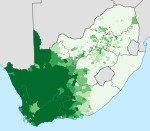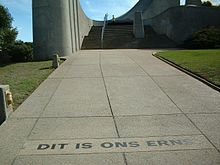Afrikaans/Introduction
This page has 2 sentences and 6 words for you to learn
The youngest Germanic language
[edit | edit source]
The name "Afrikaans" means literally "African". Afrikaans has its roots in 17th-century Dutch, but has since developed its own distinctive character and flavour in the three centuries that it developed mostly in South Africa and in parts of Namibia. Being a Germanic language, it is closely related to Dutch, English and to a lesser extent German. Compare the following:
- English: I eat an apple.
- Afrikaans: Ek eet 'n appel.
- Dutch: Ik eet een appel.
- German: Ich esse einen Apfel.
English has many more words of a Latin or French origin than Afrikaans, but a more archaic word can often show the similarities between the two languages.
- English: hound, fowl, house, milk
- Afrikaans: hond, voël, huis, melk

Most interestingly, consider these two sentences:
- My hand is in warm water.
- My pen is in my hand.
These two sentences can be either English or Afrikaans, and both have exactly the same meaning in both languages. But despite this, Afrikaans has significant differences from English. It might not be as easy to learn for an English speaker as, say, Esperanto, but it is still considered a relatively easy language to learn, and is advocated by some as a good introduction to learning Dutch and other Germanic languages in general.
Can Afrikaans people and Dutch people understand each other?
[edit | edit source]Afrikaans and Dutch are very closely related and are more or less mutually understandable. More about that here. Dutch's grammar is a bit more complex than Afrikaans', but they share a lot of the same vocabulary, albeit with slightly different spellings and pronunciations. Comparing Afrikaans and Dutch is somewhat like comparing Norwegian Bokmål and Danish.
It is a commonly held belief that Afrikaans people tend to understand Dutch quite well, and Dutch people generally need more time to understand Afrikaans. The truth of this claim may vary from individual to individual. Some Afrikaans people claim to understand written Dutch better than spoken Dutch.
Language of the oppressor?
[edit | edit source]Afrikaans is seen by some in a negative light because it was the language promoted by the apartheid regime. Some even claim that it should be forgotten. We acknowledge the terrible atrocities of that regime but still regard Afrikaans language and culture as beautiful and worthy of preservation. However, with regard to the sentiment of preservation of the language and culture, there remains an underlying tone of segregation as illustrated by the special interest groups: Afriforum; Solidariteit and the AfrikanerBond amongst others. The underlying segregationist sentiments of Afrikaner language and cultural proponents are along the lines of Hendrik Verwoerd's assertion of Apartheid as: 'Good Neighbourliness', which can be seen in the fact of the majority of Afrikaans Speakers being what, in South Africa, are called 'Coloured' people who are then represented as a minority in Afrikaans institutions and media such as the television channel KYKNET, radio RSG and newspapers like BEELD, Volksblad and magazines HUISGENOOT and ROOIROSE. What one sees then is that there is a concerted, if not wholly deliberate effort to present Afrikaans as the language of the majority of White South Africans in the same way that it had been prioritised in the 20th Century to aid the White Afrikaner Nationalism of the National Party; in its infancy in the 1910s to its introduction and preservation of Apartheid from 1948 until the introduction of the 1996 South African Constitution with its ideal of the equality of all languages.
Besides, more than half of the speakers of the language are not white and were victims of the regime's many manipulations, including ripping apart families and forcefully moving whole communities. As has been stated in the preceding paragraph, the complexity of understanding Afrikaans social presence in South Africa is dependent upon understanding what the language has been and what the attempts at it's rehabilitation are; while there remains an element of Afrikaner society that looks upon the history of Afrikaner people and the attending atrocities as something to look back upon, fondly, it is this aspect of the culture and the people that undercuts whatever is being done to disillusion afrikaans-speakers of claims of its superiority and importance over other South African languages if not English itself.
Additonally, some of the first literary works in Afrikaans were translations of holy Islamic texts by Abu Bakr Effendi that were used by the Muslim Cape slave population. Hence, the language can be equally be described as the language of the oppressed. Indeed, while there may be those who delude themselves in thinking that Afrikaans is the 'language of the oppressed', one cannot simply ignore the social environment in which 'the oppressed' came to speak Afrikaans in the first place as slaves who tried to manoeuvre their way across the Dutch language of their Slave masters. Afrikaans, then comes to be used as a way to distinguish those who created an identity out of propagating slavery and anti-equality in the Cape and further oppression down the centuries. How Afrikaans comes to be a Language in 21st Century South Africa is a fraught 200+ years history
Trivia
[edit | edit source]
- Several English words, such as "commando" and "aardvark", are of Afrikaans origin.
- The Arabic script has been used to write Afrikaans.
- Afrikaans is the only Indo-European language to have developed in Africa.
- Afrikaans is the most commonly used language among non-black South Africans.
On to Pronunciation!>>
